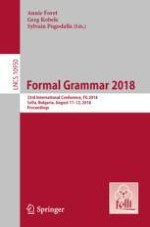2018 | OriginalPaper | Buchkapitel
Paracompositionality, MWEs and Argument Substitution
verfasst von : Cem Bozşahin, Arzu Burcu Güven
Erschienen in: Formal Grammar 2018
Verlag: Springer Berlin Heidelberg
Aktivieren Sie unsere intelligente Suche, um passende Fachinhalte oder Patente zu finden.
Wählen Sie Textabschnitte aus um mit Künstlicher Intelligenz passenden Patente zu finden. powered by
Markieren Sie Textabschnitte, um KI-gestützt weitere passende Inhalte zu finden. powered by

 is not always an abbrevation for
is not always an abbrevation for
 , which might be the case in other brands of categorial grammars. The English facts above could be taken care of by featural distinctions such as
, which might be the case in other brands of categorial grammars. The English facts above could be taken care of by featural distinctions such as
 in
in
 , rather than also positing a
, rather than also positing a
 . But in ergative languages the
. But in ergative languages the
 does not always coincide with the same LF role as it does in English, such as in Dyirbal’s control construction, where the controlled absolutive argument can be the patient NP of the transitive clause or syntactic subject of an intransitive clause, but not the ergative NP of the transitive clause. It seems to require
does not always coincide with the same LF role as it does in English, such as in Dyirbal’s control construction, where the controlled absolutive argument can be the patient NP of the transitive clause or syntactic subject of an intransitive clause, but not the ergative NP of the transitive clause. It seems to require
 where
where  is determined by verbal morphology of the controlled clause; see [
is determined by verbal morphology of the controlled clause; see [ cross-linguistically makes narrower predictions about control. We handle this problem elsewhere.
cross-linguistically makes narrower predictions about control. We handle this problem elsewhere. combinator with its vacuous abstraction
combinator with its vacuous abstraction  for
for  ; also, lexical content.
; also, lexical content.